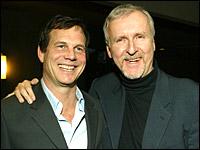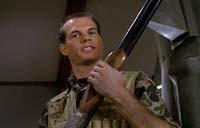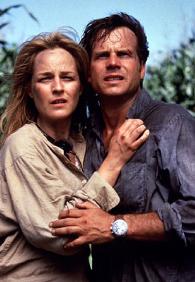|
Find interviews by: | ||
Bill Paxton (Part 2) Go back to Part 1 of this long interview
"God, I've done a lot of science fiction films. Predator 2: for a while there I thought I was going to just do all the great sequels. Another great Hollywood monster. Predator and Alien are probably the greatest monsters to emerge from Hollywood since Frankenstein and Dracula. Predator was a fabulous idea, and I think that the first Predator is hands down a much better film than the sequel, although in the case of Aliens, I think Aliens is an equally good piece of film-making to Alien. I can't say that about Predator 2. I like the director a lot, I think he's very talented. I just don't think that they developed those characters enough in the story. It was shot a little too much in a sort of 'zow! pow!' cartoon character style. I don't think there was enough for the eyes to bit into on those characters. “I thought the set-up to the first one was brilliant. I think it's one of Arnold's best movies, besides his work with James Cameron. I just love the idea of that monster: man has been a hunter, he's killed everything on this planet, including himself. And now comes this being from another planet who seems very primordial, but God, he's hunting man. I love the idea of that and I love the resourcefulness of the Predator." And of course, at the end of Predator 2 there's that little shot of an Alien skull. "Isn't that great? Jim and I both got a tremendous kick out of that. in the trophy case they show that Predator had beaten the Alien. I've seen this comic book - I've never read it - Aliens vs Predator, and I've heard they're trying to make that into a movie. I don't really know what that movie would be. And I heard that somebody's trying to do Starship Troopers, which has been around for a long time. Jim had us read that as a primer as colonial marines. I said, 'What would you read to get into this?' He said, 'I'd read Heinlein, and I'd read that.'" Was it helpful? "Oh absolutely. It's almost a throwback to the old times of imperialism, when you'd go out and you colonise different countries, if you were a British soldier. It's the same thing, just set in futuristic times."
"I don't usually mention that so much. I'm not trying to distance myself from it but sometimes as these credits get older and you get further away, you like to think that people will know you for your contemporary efforts as well as your past glories. But I've always been proud of that movie. It was the first really great role I had in a studio film. I love John Hughes and I've always wanted to work with him again. Unfortunately we've lost track of each other. I had a tremendous rapport and collaboration with him. He gave me a lot of freedom to explore that character and I had a lot of fun with it. It's become a great archetype. I always liked Animal House and I always liked the actor that portrayed Neidermeyer in Animal House. So for me, that was my Animal House." Do you worry about typecasting? A lot of your roles have been militaristic, crew-cut guys. "I like short hair. I think a man with short hair, it's a strong look. It's a very positive strong look. And for that character and The Lords of Discipline, when I played a cadet at the citadel, and obviously, playing an astronaut I wanted to go for a buzz-cut there too. It just depends on the part. I've had hair down past my shoulders on films, like Indian Summer. I've also done science fiction movies that aren't so much science fiction, they're more like 'circus fiction'. The Dark Backward is a very peculiar movie that I starred in with Wayne Newton and Judd Nelson that I'm proud of. It's a really balls-to-the-wall performance. A lot of people said it was over the top but I like to go the wall sometimes in that regard. Obviously in movies like One False Move and Apollo 13 and Twister, Jan de Bont's new movie that I'm making with Helen Hunt, these require a more low-key, let-the-audience-study-you kind of work, as opposed to a full-blown performance." What can you tell us about Twister? "The movie follows these storm-chasers who are basically meteorologists who work from grants at local universities in the mid-West, who actually go out and try to put themselves as close to the tornadoes as they can, almost like a bullfighter, in the hope of gleaning certain knowledge about tornadoes. There's still a lot of things that are not known for certain. Obviously they understand the atmospheric conditions that cause these things. It's the most extraordinary atmospheric event there is, in a way; a tornado. This whirlpool, this vortex of air. Tornadoes can have winds of over 230 miles an hour blowing in them. It's not the wind that kills you, it's the debris. It can take a match and stick it right through your head. It can take a piece of straw and stick it into a tree. These things almost defy physics. “The movie was written originally by Michael Crichton and his wife, Anne-Marie Crichton. It's produced by Steven Spielberg and Kathy Kennedy. It's Jan de Bont’s follow-up to Speed, which was a tremendous international hit and a very exciting piece of film-making. So he's hoping to top himself and I think he's going to with this. I play one of these storm-chasers, I play kind of the gunfighter who walked away from the gunfight. My ex-wife is Helen Hunt who is still an obsessive storm-chaser. In the course of the movie we're trying to place this weather package, which is like a flight recorder, that's how we explain it to the audience. It looks like an industrial washing machine, with aeronometers and cameras and all these devices for measuring different atmospheric pressures. They're hoping to get it into the tornado's path and then it will be sucked up into the tornado and they can learn what really takes place inside of a tornado. There's always been a lot of conjecture about that. There's been a few eye witness accounts, but not too many people have seen the inside of a tornado and lived to tell about it.
“I've said this in a couple of interviews: I think this is going to be to tornadoes what Jaws was to sharks. Interestingly enough, people's perception of tornadoes is this sort of anthropomorphic entity/beast/rogue/murderer. That it's capricious, it'll kill everybody in one row of houses and across the street it won't even touch them , just break the windows or something. It'll pick up a baby, suck a baby right out of a house and drop it three hundred yards away totally unharmed. By the same token, it'll pick up a cow, suck it into the stratosphere and it'll rain hamburger. These things are amazing what they'll do. I saw pictures of just crazy things that didn't make any sense. I read many accounts. “Some of the facts about tornadoes: the biggest tornado that was ever recorded in the United States was a tornado called the Tri-State Tornado of, I think, March 6th 1925. It stayed on the ground three hours which is a very long time. It started in a town in Missouri and before it was done it had gone through Illinois and Indiana. It had hit eleven towns, four of which were smeared off the face of the earth. It was very low to the ground and you couldn't even see the vortex. It was described as this 'boiling turbulent mass of blackness' moving across the southern part of the city. It was two miles wide, it cut a damage path 639 miles long, it killed 689 people, and it lasted between one-fifteen and four o'clock one afternoon in March in 1925." You obviously do a lot of research. "Well, you've got to. Any time when you're playing any kind of technical role like a scientist or an astronaut, you'd better know what the hell you're talking about because there's a lot of jargon in these professions. You talk about straight-line winds or convection or elicity or some of the terms that these guys use. You'd better know what the hell you're talking about, because if you deliver those lines and you don't know what they are, you're going to get caught. You're going to catch a bullet for your trouble." Does production style differ between low budget stuff like Roger Corman movies and big budget stuff like Apollo 13? "It's essentially the same job as an actor. I work just as hard on a low budget film as I do on an $80 million film. I approach the roles in pretty much the same way. If there's a profession involved I try to learn as much as I can about that profession. I find it a challenge as an actor to have a profession, it's a wonderful active thing to play. In any role you define the social background and the occupational background of the character. But there are different styles of acting, different kinds of movies. You do a movie like True Lies; I played the sleazy car salesman who pretends to be a secret agent to seduce these lonely women, and that's more like doing a restoration comedy piece. It's a bit heightened, you can goose it a little more. You can just wink a little more, you can just do a different kind of thing with it. “Roles like One False Move and Twister and Apollo 13 are more challenging and I'm digging them because they require me to exert myself on a certain level and not always be trying to perform for the audience. I like the idea of the enigmatic portrayal, where you just be a vessel and the audience maybe project their own thoughts on you as they watch you in the dark. It's an evolution, this process we call film acting, or just acting in general. I love science fiction films. I was a nut on Jules Verne and HG Wells growing up, especially Verne who was just a brilliant writer. Those books are really worth going back and re-reading. A few years ago I re-read 20,000 Leagues Under the Sea." You've been an astronaut, you've been a colonial marine, you've been a cowboy. Have you got any ambitions left? "I don't know. It really depends on the story and the characters. I don't really have many preconceived things. I'd like to produce films and develop my own stories. Different things will appeal to me for different reasons. I read a story in an old detective magazine of a man who was a journalist for a turn of the century newspaper. He got involved in this case where they found this dismembered body. It's almost like The Magnificent Ambersons meets Silence of the Lambs. It's a magnificent, gothic story, very creepy, and I would maybe like to develop that into a feature-length screenplay. I'm starting to move into that area. If, with Twister and Apollo, I get a little more muscle and I get the chance to produce something I might try it." Go back to Part 1 of this very long interview where Bill Paxton discusses Apollo 13, Aliens and how he met James Cameron. | ||

 You were in
You were in  You mentioned
You mentioned  “There's a rival team that's headed by Cary Elwes who is the corporate rat and really the big believer in modern technology, such as doppler radar and thermal imaging and all this stuff. Whereas my character is more of the Earth; he studies the signs of nature and almost has a sixth sense about the weather. He's totally corporately funded, he's after it for mercenistic reasons, whereas Helen and myself and the group that we chase with, we're more vocationalist. We're hoping that by unlocking the secrets of this thing that we can devise a better warning system that will save lives. So we're very idealistic, whereas Cary's character, he's more of a nemesis or an antagonist than a villain. The monster is truly the tornado. That's really what it chronicles; this fifty-year storm that's come in and it's just dropping tornadoes and every one of them's getting bigger.
“There's a rival team that's headed by Cary Elwes who is the corporate rat and really the big believer in modern technology, such as doppler radar and thermal imaging and all this stuff. Whereas my character is more of the Earth; he studies the signs of nature and almost has a sixth sense about the weather. He's totally corporately funded, he's after it for mercenistic reasons, whereas Helen and myself and the group that we chase with, we're more vocationalist. We're hoping that by unlocking the secrets of this thing that we can devise a better warning system that will save lives. So we're very idealistic, whereas Cary's character, he's more of a nemesis or an antagonist than a villain. The monster is truly the tornado. That's really what it chronicles; this fifty-year storm that's come in and it's just dropping tornadoes and every one of them's getting bigger.